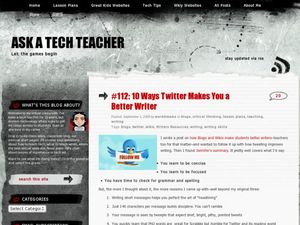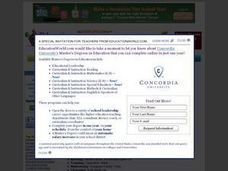Curated OER
What's it Worth?
In this reading worksheet, students spell 5 pictures using scrabble letters. All words end in -uck. Students also add up the score of each word
Curated OER
What’s it Worth? (-ar)
In this -ar word family worksheet, 1st graders will cut and glue letter tiles to spell an -ar family word to match a picture. Then students will add the value of each tile to find the sum of the word, like in Scrabble.
Curated OER
What’s it Worth? (-ew)
For this -ew word family worksheet, 1st graders will cut and glue letter tiles to spell an -ew word family word to match a picture. Then students will add the value of each tile to find the sum of the word, like in Scrabble.
Curated OER
Ways Twitter Makes You a Better Writer
Practice being concise. Exercise your vocabulary. Improve your editing skills. The contention in this lesson plan is that by imposing a 140 character limit, the Twitter format actually helps improve writing skills. And of course class...
Curated OER
Forces in Motion-Science Puzzlers, Twisters & Teasers
In this physical science instructional activity, students complete 6 questions about forces in motion in the form of word puzzles, poems, riddles, scrambles, and brain teasers.
Curated OER
Latin Roots: spir, viv/vit, vid, vis
Young readers rewrite the Latin root words on the blank lines and then mark the roots spir, viv, vid, vit, and vis in the 20 word list.
Curated OER
A Puzzle a Day Provides Practice That Pays
Students complete a variety of daily enrichment puzzles designed to encourage critical thinking skills, while developing and reinforcing math and language arts skills.
Curated OER
Jo's Table
Students continue a sequential pattern using a partially filled in table and simple addition exercise. They use problem solving strategies such as guess and check, make a table, look for patterns. They discuss their finding with the class.









